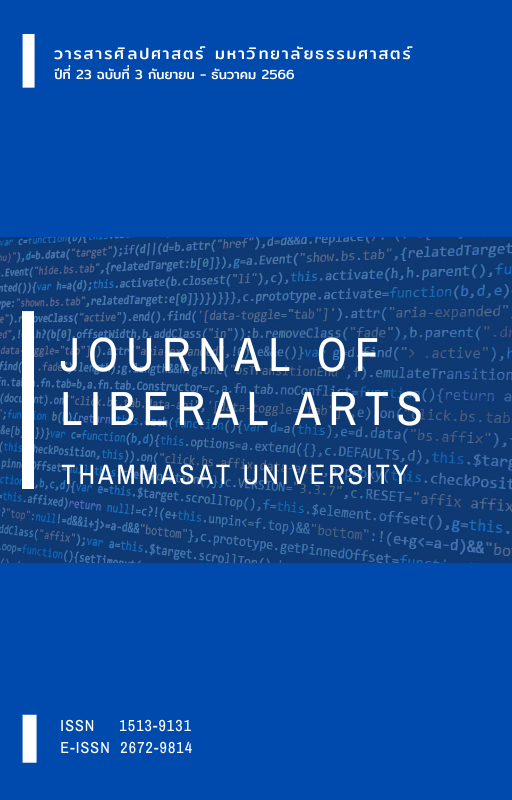How an Internship Program for Undergraduate Majors in Japanese Influences Cognitive and Non-Cognitive Skill Development
Main Article Content
Abstract
This research studied how an internship program influences undergraduates and curricula in terms of student cognitive and non-cognitive skills. The goal was to improve education management and better prepare students to be qualified personnel. Data was collected by structured questionnaire from samples, all undergraduate interns, and entrepreneurs sponsoring them. The results were that sample internship goals influenced cognitive and non-cognitive skills. After internships, samples self-assessed that goals were achieved and satisfaction with the internship was at a high level. Entrepreneurs expected interns to have high levels of cognitive and non-cognitive skills, with the latter slightly exceeding the former. After internships, entrepreneurial evaluation of student cognitive and non-cognitive skills was less than hoped for, but at a statistically insignificant level. Student communication skills were less than entrepreneurial expectations for all work groups. These findings suggest that internships help underline weaknesses in students and curricula, revealing the inability of current education management to promote effective communication skills. Developing non-cognitive, especially communication skills, is urgently needed to find a curriculum enhancing communication skills more effectively, meeting business criteria.
Downloads
Article Details

This work is licensed under a Creative Commons Attribution-NonCommercial-NoDerivatives 4.0 International License.
References
ประกาศกระทรวงการอุดมศึกษา วิทยาศาสตร์ วิจัยและนวัตกรรม เรื่อง กำหนดปรัชญาการอุดมศึกษาไทยและระบบอุดมศึกษาใหม่ ด้านการสร้างบัณฑิตและพัฒนากำลังคน. (27 พฤษภาคม 2564). ราชกิจจานุเบกษา. เล่ม 138 ตอนพิเศษ 144 ง. หน้า 2.
วราลี จันทโร และ ธนภัส สนธิรักษ์. (2563). การวิเคราะห์ปัญหาด้านการใช้ภาษาญี่ปุ่นที่พบในการฝึกงาน: กรณีศึกษาผู้เรียนวิชาเอกภาษาญี่ปุ่น. วารสารเครือข่ายญี่ปุ่นศึกษา, 10(1), 65-82.
สาขาวิชาภาษาญี่ปุ่น. (2560). ผลการสำรวจความคิดเห็นของบัณฑิตสาขาวิชาภาษาญี่ปุ่น มหาวิทยาลัยธรรมศาสตร์. มหาวิทยาลัยธรรมศาสตร์, คณะศิลปศาสตร์.
สาขาวิชาภาษาญี่ปุ่น. (2561). หลักสูตรศิลปศาสตรบัณฑิต สาขาวิชาภาษาญี่ปุ่น หลักสูตรปรับปรุง พ.ศ. 2561. มหาวิทยาลัยธรรมศาสตร์, คณะศิลปศาสตร์.
สำนักงานปลัดกระทรวงการอุดมศึกษา วิทยาศาสตร์ วิจัยและนวัตกรรม, สำนักมาตรฐานและประเมินผลอุดมศึกษา. (2560). เกณฑ์มาตรฐานหลักสูตรระดับอุดม พ.ศ. 2558 และเกณฑ์มาตรฐานที่เกี่ยวข้อง. วงศ์สว่างพับลิชชิ่ง แอนด์ พริ้นติ้ง.
Ahuja, A., Netto, C. L. M., Terrana, A., Stein, G. M., Kern, S. E., Steiner, M., Kim, R., & Walsh, K. K. (2022). An outcomes-Based framework for integrating academics with student life to promote the development of undergraduate students’ non-cognitive skills. Frontiers in Education, 7, 1-8. https://doi.org/10.3389/feduc.2022. 782214
Bjorklund-Young, A. (2016). What do we know about developing students’ non-cognitive skills?. Institute for Education Policy, John Hopkins School of Education. 1-8. https://jscholarship.library.jhu.edu/bitstream/handle/1774.2/63014/noncognitiveskillsmastheadfinal.pdf?sequence=1&isAllowed=y
Brunello, G., & Schlotter, M. (2011). Non cognitive skills and personality traits: Labour market relevance and their development in education & training systems. IZA Discussion Paper, 5743, 1-45.
Farrington, C. A., Roderick, M., Allensworth, E., Nagaoka, J., Keyes, T. S., Johnson, D. W., & Beechum, N. O. (2012). Teaching adolescents to become learners. The role of non-cognitive factors in shaping school performance: A critical literature review. University of Chicago Consortium on Chicago School Research. https://www.kipp.org/wp-content/uploads/2016/11/Teaching_Adolescents_to_Become_Learners.pdf
Grover, S. M. (2005). Shaping effective communication skills and therapeutic relationships at work. AAOHN Journal, 53(4), 177-182.
Heckman, J. J., Stixrud, J., Urzua, S. (2006). The Effects of Cognitive and noncognitive abilities on labor market outcomes and social behavior. Journal of Labor Economics. 24(3), 411-482.
Hong-ngam, J. (2012). Effects of cognitive and non-cognitive skills on earning outcomes: A case of Khonkaen province of Thailand. NIDA Economic Review, 6(2), 1-22.
Iwai, T. (2019). A study of internship among university freshman and university sophomore -the relationship between support from others and motivation to learn independently-. Bulletin of the Japan Society of Internship, 21, 11-19. (in Japanese)
Kai Zhou. (2016). Non-cognitive skills: Definitions, measurement and malleability. Paper commissioned for the Global Education Monitoring Report 2016, Education for people and planet: Creating sustainable futures for all.
Kawano, S. (2011). Effectiveness of internship on Learning Outcomes of Students in humanities and social sciences - the case of Waseda University-. Japanese Society of Internship, 14, 9-15. (in Japanese)
Kubota, A. (2004) Saabisu Nihongo to iu kangaekata: kankou toshi hawai de no nihongo kyouiku no genjou kara kangaeru. Showa joshi daigaku daigakuin nihongo kyouiku kenkyuu kiyou, 2, 65-69. (in Japanese)
Kyllonen, P. C. (2012). The importance of higher education and the role of noncognitive attributes in college success. Pensam. Educ, 49(2), 84-100. https://doi.org/10.7764/PEL.49.2.2012.7
Miura, K. (2016). A study on the educational effects of internship – from the point of view of employment awareness effect and learning motivation effect-. Japanese Society of Internship, 19, 1-10. (in Japanese)
Miyata, H. (2021). Trends and Issues in Internship Research at Universities. Japanese Society of Internship, 24, 81-89. (in Japanese)
Nyhus, E. K., & Pons, E. (2005). The effects of personality on earnings. Journal of Economic Psychology, 26(3), 363-384. https://doi.org/10.1016/j.joep.2004.07.001


